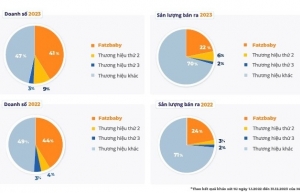Customer behaviours shaping sustainability of e-commerce
Consumer demand is growing rapidly and diversely, requiring quick adaptation and response from both sellers and buyers, and is one of the three main trends that have a profound impact on global e-commerce, according to a report announced by Alibaba.com last week.
 |
| Customer behaviours shaping sustainability of e-commerce - illustration photo/ Source: Shutterstock |
The report, titled Explore the Future of Business-to-Business E-commerce, noted, “Consumers are increasingly paying more attention to sustainable products. According to IBM Research, 77 per cent of consumers consider sustainability and environmental responsibility to be relatively important brand values.”
The report also cites the results of a survey of more than 2.7 billion internet users worldwide conducted by UK research company GWI in Q3/2023 to confirm that nearly 85 per cent of consumers prefer to experience products from socially responsible brands and attach importance to sustainability.
Last year, Alibaba.com released top insights on sustainable product demand from buyers worldwide in 2022-2023. Mike Zhang, head of Vietnam business at Alibaba.com said that the company is using this data to help small businesses and suppliers alike recognise the global need and increasing demand for sustainable products. “A key indicator of growth for sustainable product demand includes a large uptick in keyword searches relating to sustainability on Alibaba.com’s request for quotation feature, which allows buyers to share their requirements for product design and manufacturing and receive pricing details from desired suppliers,” Zhang said.
Alibaba.com saw an 88 per cent global rise in keywords such as sustainable, eco-friendly, biodegradable, organic, and reusable over the past year, and the top five countries purchasing sustainable products on Alibaba.com were the United States, the United Kingdom, Canada, Australia, and Germany, he added.
In Vietnam, a survey conducted by NielsenIQ Vietnam in 2023 on the consumer habits of Vietnamese people revealed that sustainability and environmental friendliness are one of the five key factors influencing customers’ purchasing decisions. Some 55 per cent of respondents considered this factor to be highly important, while 37 per cent considered it to be important.
Grasping that mentality, some e-commerce platforms not only increase the presence of environmentally friendly products from responsible suppliers but also make efforts to find solutions for conversion to more sustainable business models, especially in reducing emissions in operations to gain sympathy from customers.
According to a report by the Vietnam Chamber of Commerce and Industry and Lazada last year, the sustainability of e-commerce platforms is shown in business models, product value, ecosystem development, and financial management.
“Focusing on developing business models in depth, changing operations based on understanding consumer needs will be a long-term strategy that will create the next push for e-commerce,” commented Dang Anh Dung, deputy general director of Lazada Vietnam.
Since 2017, Lazada has changed its thinking about using delivery vehicles, bringing electric bicycles into transportation. Lazada’s e-bikes have a large trunk, 50 per cent higher load capacity than regular motorbikes, contributing to saving 25-35 per cent of fuel costs and 50 per cent of maintenance costs, and are considered a way to improve environmental pollution in large cities.
Lazada also strives to convert to using solar energy at distribution centres in Indonesia and Vietnam, applying AI technology to automate up to 99 per cent, while machine learning helps to increase operating efficiency and reduce emissions.
The e-commerce platform also strives to reduce waste from product materials and packaging by limiting plastic waste. A 2023 environmental report published by Lazada shows that, in just one year, it reduced greenhouse gas emissions by 10 per cent compared to the same period last year. According to a report on plastic packaging waste from e-commerce in Vietnam in 2023 from the Vietnam E-commerce Association, with a growth rate of over 25 per cent annually, by 2030, the amount of plastic waste from e-commerce will reach 800,000 tonnes.
 | Fatzbaby best-selling brand on e-commerce platforms According to research on e-commerce markets by data analysis platform Metric, Fatzbaby accounted for 41 per cent of the mother-and-baby care sector's revenue, the largest share for any company between 2022 and 2023. |
 | Experts urge promotion of digital transformation in logistics, e-commerce Applying technology in logistics and e-commerce will bring many benefits, thus optimising the efficiency of these two sectors, and contributing to reducing logistics costs for the entire economy, heard a workshop in Hanoi on May 16. |
 | E-commerce frauds require utmost in attention from regulators Great efforts have been made to combat counterfeit goods and trade fraud products on e-commerce channels as online shopping has become increasingly popular for many people amid booming e-commerce activities. |
 | Vietnamese e-commerce firms face challenges Vietnamese e-commerce businesses face many challenges, such as high international standards for product quality and competitiveness. |
What the stars mean:
★ Poor ★ ★ Promising ★★★ Good ★★★★ Very good ★★★★★ Exceptional
 Tag:
Tag:
Related Contents
Latest News
More News
- Masan Consumer names new deputy CEO to drive foods and beverages growth (February 23, 2026 | 20:52)
- Myriad risks ahead, but ones Vietnam can confront (February 20, 2026 | 15:02)
- Vietnam making the leap into AI and semiconductors (February 20, 2026 | 09:37)
- Funding must be activated for semiconductor success (February 20, 2026 | 09:20)
- Resilience as new benchmark for smarter infrastructure (February 19, 2026 | 20:35)
- A golden time to shine within ASEAN (February 19, 2026 | 20:22)
- Vietnam’s pivotal year for advancing sustainability (February 19, 2026 | 08:44)
- Strengthening the core role of industry and trade (February 19, 2026 | 08:35)
- Future orientations for healthcare improvements (February 19, 2026 | 08:29)
- Infrastructure orientations suitable for a new chapter (February 19, 2026 | 08:15)




















 Mobile Version
Mobile Version